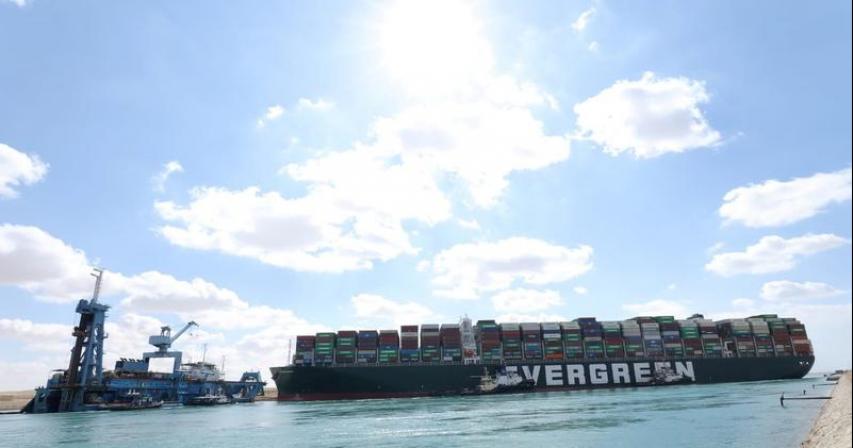Salvager hopes to free ship blocking Suez Canal by start of next week
- 4 years ago

Efforts to dislodge a giant container ship blocking the Suez Canal had allowed its stern and rudder to move on Saturday, but it remained unclear when it could be refloated, the head of the canal authority said.
The 400-metre (430-yard) long Ever Given became wedged diagonally across a southern section of the canal amid high winds early on Tuesday, disrupting global shipping by blocking one of the world’s busiest waterways.
About 15% of world shipping traffic transits the canal, and hundreds of vessels are waiting to pass through the waterway once the blockage has been cleared.
Suez Canal Authority (SCA) Chairman Osama Rabie said he hoped it would not be necessary to resort to removing some of the 18,300 containers from the ship to lighten its load, but that strong tides and winds were complicating efforts to free it.
“The ship’s stern began to move towards Suez, and that was a positive sign until 11 p.m. (2100 GMT) at night, but the tide fell significantly and we stopped,” Rabie told journalists in Suez.
“We expect that at any time the ship could slide and move from the spot it is in,” he added.
Dredgers had removed some 20,000 tonnes of sand from around its bow by Friday. A Dutch firm working to free the vessel said it could be freed by the start of next week if heavier tugboats, dredging and a high tide succeed in dislodging it.
Tugging attempts restarted on Saturday afternoon and further efforts were planned on Saturday night and Sunday morning, three sources with knowledge of canal operations said, though they added it could be necessary to remove more sand from around the ship to free it.
“We aim to get it done after the weekend, but everything will have to work out exactly right for that,” Peter Berdowski, chief executive of Boskalis, told Dutch TV programme Nieuwsuur late on Friday.
Boskalis owns Smit Salvage, which was brought in this week to help with efforts by the Suez Canal Authority (SCA) to dislodge the ship.
“The bow is really stuck in the sandy clay, but the stern has not been pushed totally into the clay, which is positive. We can try to use that as leverage to pull it loose,” Berdowski said.
“Heavy tugboats, with a combined capacity of 400 tonnes, will arrive this weekend. We hope that a combination of the tugboats, dredging of sand at the bow and a high tide will enable us to get the ship loose at the beginning of next week.”
Egyptian Prime Minister Mostafa Madbouly on Saturday thanked foreign partners for offers to help refloat the ship.
Shipping rates for oil product tankers nearly doubled after the ship became stranded, and the blockage has scrambled global supply chains, threatening costly delays for companies already dealing with COVID-19 restrictions.
If it drags on, shippers may decide to reroute around the Cape of Good Hope, adding about two weeks to journeys and extra fuel costs.
Rabie said the ships that are waiting were free to reroute around the Cape of Good Hope, but none had yet done so.
He said 321 vessels were waiting to enter or continue their transit through the canal. Those included dozens of container ships, bulk carriers and liquefied natural gas (LNG) or liquefied petroleum gas (LPG) vessels, according to a shipping source.
Fourteen tugs have so far been involved in efforts to refloat the Ever Given, although Boskalis and Smit Salvage have warned that using too much force to tug the ship could damage it.
Berdowski said a land crane would be brought in at the weekend which could lighten the Ever Given’s load by removing containers, though experts have warned that such a process could be complex and lengthy.
“If we don’t succeed in getting it loose next week, we will have to remove some 600 containers from the bow to reduce the weight,” he said.
“That will set us back days at least, because where to leave all those containers will be quite a puzzle.”
Reporting by Ahmed Fahmy in Suez, Omar Fahmy and Aidan Lewis in Cairo, Nafisa Eltahir in Khartoum, Yusri Mohamed in Ismailia, Bart Meijer in Amsterdam, and Euan Rocha in Mumbai; Writing by Aidan Lewis; Editing by Jan Harvey and Louise Heavens / REUTERS
Comments